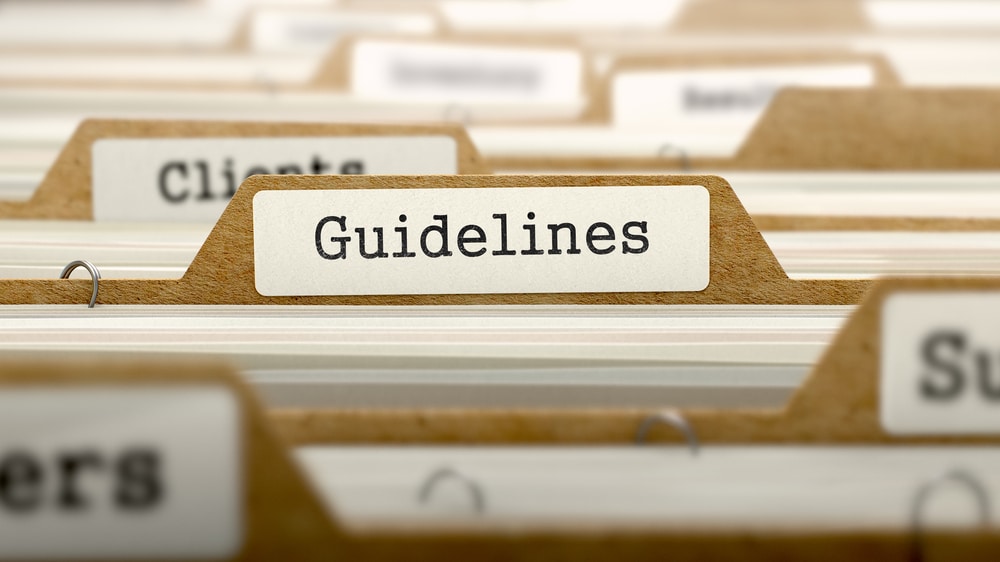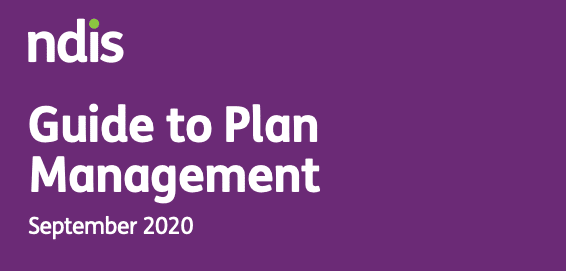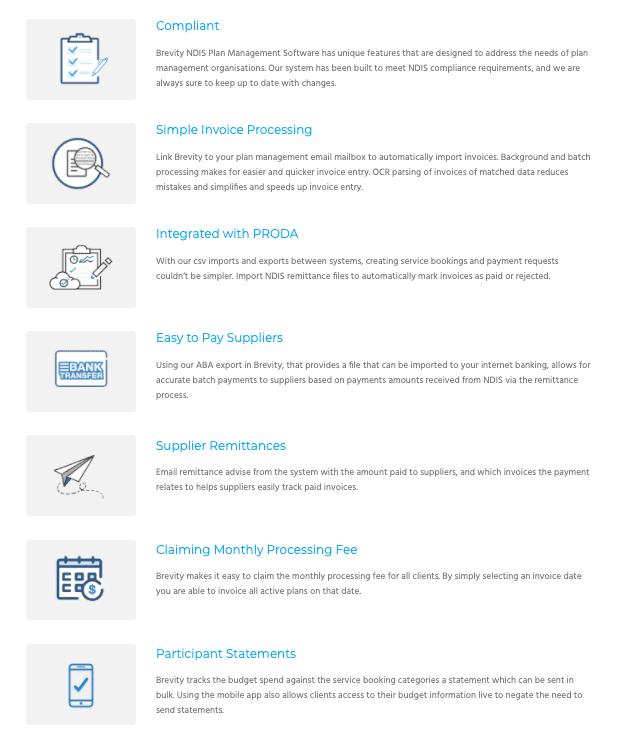
The Complete Guide To NDIS Plan Management Guidelines
NDIS plan management guidelines are comprised of keeping every party accountable for delivery of NDIS participant supports, correct handling of NDIS funding, ethical editing of service agreements, and more. Based on the NDIA’s guide to plan management, additional guidelines include proper payments, regular plan updates, and easy data access.
Late last year, the National Disability Insurance Agency (NDIA) released its eagerly anticipated Guide to Plan Management. The Guide provides a comprehensive overview of NDIS plan management policies and procedures.
» LEARN MORE: See How Brevity Helps NDIS Plan Managers Streamline Daily Business Operations
It also covers the rules and operational guidelines NDIS plan managers must follow.
Being a plan manager is an important job. Within this role you hold the power to help NDIS participants achieve their individual life goals and experience financial freedom.
Following NDIS guidelines is key to your success in the plan management business. From the outset, there has been significant confusion around the NDIS, and the recent release is still “heavy” to go through.
In this article, we will help clear up any uncertainties, provide you with all of the key information, and summarise the essential requirements for plan managers.
What are NDIS plan management guidelines for?

The NDIA released the Guide to inform NDIS participants about what they can expect from plan management as well as guide the practice of plan managers alike.
In short, NDIS plan management guidelines are all about demonstrating that as a plan manager you are working toward achieving outcomes for your clients.
This means that as a plan manager you help participants:
- Increase their financial and plan management skills
- Slowly learn how to self-manage their plan
- Pay providers themselves
- Increase their choice of providers
When it comes to accountability, plan managers must share information with participants about the management of their NDIS funding.
Plan managers need to inform their clients how funds are being used to purchase the types of supports in line with their plan.
Furthermore, plan managers must update clients with monthly expenditure reports as well as the balance of funds remaining. NDIS plan management guidelines help to ensure that plan managers are abiding by their clients’ wants and needs. They are important to follow as doing so will help ensure your success as a plan manager.
However, because of the range of guidelines in place as well as the range of interpretations possible, you may be asking what are the most important guidelines to follow? Let’s dive straight into answering this.
Which Guidelines Do NDIS Plan Managers Need To Follow?
Plan managers must adhere to the NDIS plan management guidelines to ensure their clients’ finances are in order. Their management of a participant’s NDIS plan should both recognise and support the client’s individual life circumstances and goals.
Thus, it is essential plan managers follow all of the guidelines.
You cannot afford to neglect a single guideline and risk working outside of the NDIS plan management policies and procedures. With this said, let’s take a look at the responsibilities you have as an NDIS plan manager.
You cannot afford to neglect a single guideline and risk working outside of the NDIS plan management policies and procedures.
When first meeting your new client, your role as a NDIS plan manager should be established and agreed upon.
Within this first meeting it is essential that you also discuss:
- The responsibilities of each party (plan manager and participant) in ensuring supports obtained are in line with the participant’s NDIS plan
- How much NDIS funding the participant has remaining
- How invoicing is to be carried out
- Whether the client wants to sight invoices sent to you for payment
- Your processes as plan manager for paying invoices
- How the client’s NDIS plan budget will be managed
- How any disputes will be managed and resolved
Furthermore, under the NDIS plan management guidelines, there are ongoing service responsibilities for plan managers…
Additional Guidelines for NDIS Plan Managers
Below, we’ve broken these down for you and explained each one in a bit more depth:
- Proper payments – Plan management provider must ensure invoices received from providers align with the client’s plan. Furthermore, plan managers must arrange for the prompt payment of invoices from service providers (within two business days of receiving payment from the NDIS).
- Correct payments – NDIS plan management guidelines stipulate that your client’s NDIS funds are spent in accordance with their plan. However, just to clear up any confusion, it is not your role to decide whether or not particular support services are ‘reasonable and necessary’.
- Regular updates – Plan managers are obligated to supply financial statements every month to their client. These statements should update the participant about the amount spent since the previous statement, the remaining balance, and whether or not the spending is in line with forecasting.
- Full payment history – If your client decides to work with a different plan manager, you must supply their total plan payments history.
- End date agreement – If a participant decides to opt for a different style of plan management (either self-managed or NDIA managed) or change plan managers, then you need to come to an agreement about the end date after which you will no longer provide your services.
- Access – the NDIS plan management rules and operational guidelines requires you to enable your client to access a wide range of different registered providers.
As can be seen, the NDIS plan management guidelines are multi-faceted.
That is why it is crucial that plan managers undergo NDIS plan management training and maintain scrupulous records of their management of funds.
How Software Can Help with Plan Management

As a plan manager, you want nothing more than to help your clients achieve their life goals. Correct implementation of NDIS guidelines ensures that you are carrying out your mandate.
NDIS plan management guidelines require that complete and accurate records are kept by plan managers. Invoices for all of the supports and services obtained as part of a participant’s plan must be recorded.
Furthermore, it is essential that you have secure means of storing and protecting your client’s information, both electronically and physically.
The data that you keep is a most important tool in ensuring that your plan management business is not only compliant, but also working as efficiently as possible. NDIS plan management software such as Brevity enables you to secure all of your necessary client records in one place.
When it comes to managing clients’ plans, Brevity also empowers you to be proactive in tracking plan spend and generating usage statements for clients.
Try it out with a demo today!
Originally published 27 May 2021
» LEARN MORE: See How Brevity Helps NDIS Plan Managers Streamline Daily Business Operations
Frequently asked questions
NDIS plan management guidelines help to ensure that plan managers are abiding by their clients’ wants and needs. They are important to follow as doing so will help ensure your success as a plan manager.
It is essential plan managers follow all of the guidelines. You cannot afford to neglect a single guideline and risk working outside of the NDIS plan management policies and procedures.
NDIS plan management guidelines require that complete and accurate records are kept by plan managers. Invoices for all of the supports and services obtained as part of a participant’s plan must be recorded. Furthermore, it is essential that you have secure means of storing and protecting your client’s information, both electronically and physically.
The best practice approach for plan managers to follow is to remain compliant, maintain excellent records and always ensure that NDIS funds are spent in line with clients’ plans.



